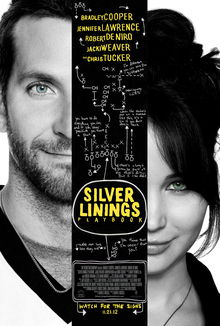A Rebellious Perspective on Mental Health (2013)
@SunetraSenior

“This is what I learned at the hospital. You have to do everything you can, you have to work your hardest, and if you do, you have a shot at a silver lining.”
Pat Solitano
Despite little publicity, comedy-drama, Silver Linings Playbook (2012), continued to gain momentum throughout 2013. Otherwise known in the film industry as a ‘Sleeper Hit’, there was a timeless dimension to this release. Why were viewers increasingly spreading the word and critics unanimously impressed? The answer lies in the innovative goodwill of director, David O. Russell, who wished to create “a film that would help (people like his son who have suffered from depression and self-doubt) feel more a part of the world and not so separate from it” (Feinberg, Hollywood Reporter). The screenplay is based on the book by Matthew Quick. As Russell collaboratively sought to dissolve the stigmatic divide between mental health and the rest of society, he ultimately helped deconstruct the wider ideological dysfunction of erroneous capitalist thinking explored within the story: namely, a shallow standard of success and the unhealthy pressure that this creates to be perfect all the time.
This is immediately evident in the unusually uplifting setting. Following a manic episode and eight months in a psychiatric facility, the bipolar protagonist, Pat Solitano (Bradley Cooper), has lost his wife, home and job. As the neighbors try to exploit this misfortune by attempting to catch video footage of the “unpredictable psycho who’s moved back down the street,” it seems all he really has left is humiliation. However, Pat surprises audiences. He stands invigorated, expressed in his passionate mantra, ‘Excelsior!’ or ‘Ever Upwards!’ in Latin. As we come to discover, his breakdown is not only inevitable, but also especially empowering. He can see that he has always had himself and this is what fundamentally matters. Being institutionalized allows him to clearly confront and explore his emotions, helping him build strong character and negotiate his flaws. In fact, it is the fixation on traditional markers of pristine success that had prevented him from reaching a state of happiness. In short, the narrative proudly shows that those who are fighting emotional battles are paradoxically closer to the cathartic truth. Going beyond one man’s recovery from mental illness, Silver Linings Playbook highlights personality as the biggest asset. The ability to own this, the film asserts, is the path to higher fulfilment. Unconvinced? Enter fire-cracker of an individual, Tiffany Maxwell, exquisitely played by Jennifer Lawrence. As a fellow sufferer of volatile mental health, she faces the same struggle as Pat, working through bereavement, which has similarly lost her a staple set of social privileges. This includes the additional isolating discrimination from the public. As vital to the message of the film, she embodies Pat’s enlightenment at the clinic, reflecting his journey back at him. At one point, she boldly states: “I like all the parts of me that are sloppy and dirty, can you say the same?” Pat’s inner struggle is then charted through their budding relationship as he fights to reinforce what he has learned at the clinic, often lapsing into an obsessive focus on his conventional past.
This is specifically shown through his inability to relinquish the attachment to his glorified ex-wife whose cheating on him had triggered Pat’s episode. Despite the harm that their marriage had caused them both, he continues to be seduced by the glamour of the social status that this life represented. The slow burner of a romance with alternative Tiffany is a cipher for gritty potential actually being realised: the capacity for pure self-love truly embraced. Here, Russell also does well to avert the common stereotype of the ‘Manic Pixie Dream Girl’: a millennial mystification that shows women as a one-dimensional supplement to the growth of a typically self-centred male. Sexually open and outspoken, the candid Tiffany’s character conversely counteracts the idea of a sycophantic saviour while staying authentic to the tropes of a traditional comedy-drama. Indeed, the redemption of Russell’s lead is that he takes responsibility for his shortcoming of obliviousness where there is a nuanced portrayal of Tiffany’s equally challenging obstacles. She has fought with self-destructive behaviour with an admitted tendency to over-give to cope with the sudden loss of her loving husband. Perhaps feeling that this action will, in some way, bring him back.

So, when Pat does eventually mutually invite Tiffany into his heart, it is a reinforcement of the holistic lesson of damaged yet vibrant individuality. Having accepted their faults and worked on them, Pat and Tiffany can emerge surer, completer people who at once move those around them. Indeed, the climax of the film magnetically revolves around a dance competition which Tiffany asks Pat to enter as one of her biggest passions. Although the couple perform adequately in terms of technical refined skill, theirs is one of the most idiosyncratically compelling routines and promotes flourishing of oneself in the entirety. Instead of taking the notion of performing socially too seriously, the two let themselves have creative fun with it. This also physically reflects the fluid, flexible model of personal achievement that the movie generally seeks to champion. The real prize is the freeing reward of a fully consolidated uniqueness that incorporates the incalculable yet pleasantly surprising nature of broader uncontrollable life. Indeed, cultivating such psychological richness also brings forth the deeper marker of an existence lived well: individualistic social respect, meaningful connection with others, and even basic prosperity that organically flows.
As well as delivering an exciting show through raw conviction, Pat cements an invaluable love with Tiffany and wins an impromptu wager! It is better to be honest, the movie tells us, than to live a glamourous lie. The sepia-toned cinematography throughout emphasises the meditative beauty of this striking yet uncommon sentiment. Indeed, by contrast, the storyline of Pat’s best friend, Ronnie, which runs parallel in the background, underscores the toxicity of accruing superficial merit over fostering spiritual depth. Ronnie maintains a high-paid job, is revered professionally and boasts a blonde-bombshell wife, played by Julia Stiles. Apparently triumphant, he is inconsolably distraught. “I’m miserable: stressed all the time,” he admits to Pat as tellingly gives a tour of his massive, immaculate house. His life has become one stifling stagnant bore. Here, the quirky humour of the film with its bursts of farce further perfectly subverts the popular concept of modern functionality: it is unmasked as the mass corrosive illness. Indeed, later, Ronnie also confides to Pat that he secretly smashes random objects to the heavy-metal band, Metallica, to channel his pain to which the formally hospitalised Pat responds: “That is f***ed up, Ronnie.” In this way, the customary formula for contentment is emphasised as so contradictory that it’s redundantly absurd. In another scene, Pat exuberantly wakes his parents in the middle of the night, outraged at the writer Earnest Hemingway’s unnecessary negativity. Moments such as these then also keep the tone of the movie light while remaining realistic.
Finally, far from being a forgotten mess, Pat, the so-called ‘mental patient’ emerges as the realer, admirable role model, robustly able to be his best. Vividly distinct and profoundly together, he emerges as the new bastion of progress. He announces to his family: “Did you ever think that people like me can see something you can’t?” Oppositely, acquaintance, Ronnie, is derailed by an eviscerating commercial expectation that only systematically undercuts. Indeed, he is unconsciously drawn towards Pat’s brightness, envying the priceless value he cannot ever seem to attain. This is only made worse by the burdensome responsibility of growing material assets that intensify the agonising emptiness. He also lacks the cultural avenue to effectively articulate his frustration to considerably mature. Such is the pitfall of a nominally successful position.
Although consummately organised, Ronnie is the one who is frighteningly unstable. Thus, Russell’s sensitive depiction of the experience of mental suffering reaches out to remedially motivate us all. It is no coincidence that Silver Linings Playbook came out just before the winter holidays. The creator’s sincere concern for a loved one emanates a healing message of forgiveness to universally lift the spirit. In lieu of the potential onset of judgemental thoughts in darker days, Russell encourages the practice of respectful self-compassion for all. This reciprocally summons positive validation which propagates from the world outside. Prioritising wellness of the soul over the willingness to conform, Silver Linings playbook corrects the misplaced focus of the consumerist ideal. Being intuitively brave, the film tells us, will bring us closer to the right people, a tangible trajectory of our dreams, and most importantly, ourselves.

Sunetra (Sunny) is an indie journalist, actress and short film writer. She is a popular columnist at a London weekly, and writes extensively on social democracy, Feminism and the psychological nuances of modern society. Her movies have been screened at the London Short Film Festival (LSFF) and Bristol Independent Short Film Festivals (BISFF).
Her progressive, perceptive writing cuts across film, current analysis and media. Known for its unerring emotional intelligence, the work focuses on the socio-politically urgent yet unseen. She enjoys combining arts, news and mindfulness to create a unique perspective, championing social change. In 2019, she was published in Oxford University’s journal, PHENOTYPE, investigating the relationship between apex dinosaurs and modern economy!
Sunetra specialises in the area of psycho-social evolution. To this end, her Sunshine Reviewing column salutes film, television and media that radiate a uniquely joyful message. Enjoy!
T: @SunetraSenior

